Imagine it’s late summer and you’ve been running your aircon for weeks…
But your bill is negative.
That’s right.
You haven’t worried once about keeping on the AC on all day… and you’re getting paid €9,32 in your electric bill.
Is it a mistake?
No.
It’s what is finally possible with a solar panel installation and the new ‘virtual battery’ feed-in tariff in Spain.
Below, we answer 10 common questions about the virtual battery.
instant calculation!
How Quickly Could You Break Even on a Solar Installation with €0 Electric Bills?
We’ve created an online calculator that generates an instant annual return and break even estimation with a €0 bill, fully optimised system and current package of solar incentives in Spain factored in.
Click below to get a result in the next 2-3 minutes.
10 Common Questions About the Virtual Battery in Spain
- What Is a Virtual Battery?
- How Do Virtual Batteries Work?
- How This Costa Blanca Homeowner Saved €37,78 by Switching to a Virtual Battery
- The 3 Features of a Virtual Battery
- What’s the Benefit of a Virtual Battery
- Why is a Virtual Battery Better than a Solar Battery?
- Why Isn’t Everyone in Spain on a Virtual Battery Deal?
- Why Did Spain Take so Long to Introduce the Virtual Battery?
- How Many Solar Panels Would I Need to Earn Credit With a Virtual Battery?
- What if I Don’t Want to Install Solar Right Now?
What Is a Virtual Battery?
Here’s the quickest way to understand what a virtual battery is.
You use the grid as a solar battery.
Instead of charging a solar battery in your home you ‘charge’ a virtual battery that’s managed by your electricity provider in the grid.
But there’s one major difference.
A virtual battery is a store of credit (in euros) and not electricity (in kWh).
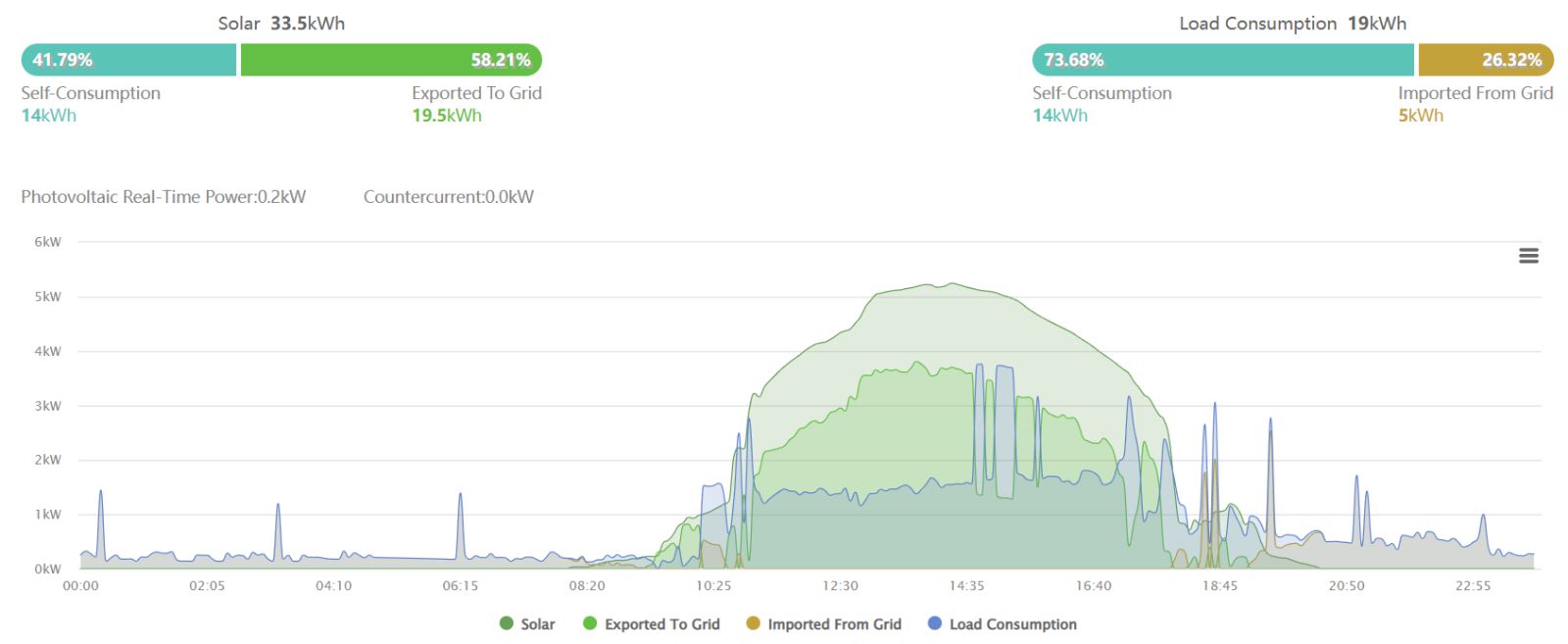
How Do Virtual Batteries Work?
You may have heard of a ‘feed-in tariff’ or ‘net metering’.
And so you’re asking…
What’s the difference between a feed-in tariff and a virtual battery?
A huge difference.
On the surface they look the same:
- A feed-in tariff also pays you for electricity sold to the grid.
But underneath they are not the same:
- A feed-in tariff comes with a standing charge no matter how much electricity you sell

How This Costa Blanca Homeowner Saved €37,78 By Switching to a Virtual Battery
Remember the homeowner earning €9,32 per month?
After installing solar panels we put him on the best feed-in tariff on the market in Spain.
In his final month on a feed-in tariff he paid a standing charge of €28.46.
But here’s the thing.
In a cost comparison the results showed he would earn €9,32 in credit with our new virtual battery provider.
What had changed?
- Both bills are for the same month
- Both bills have him selling the same amount of electricity to the grid
But in one bill he pays €28.45 and in the other he earns €9.32!
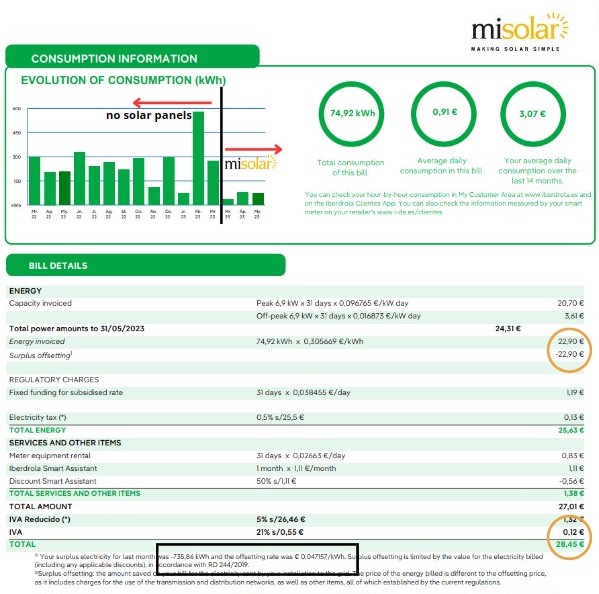
The homeowner paid €28.46 in standing charges and gave around €37.78 worth of solar electricity to Iberdrola.
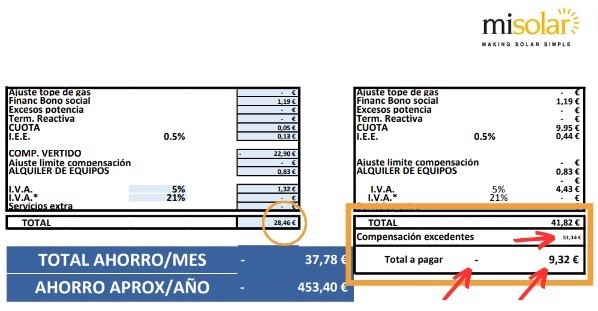
This comparison shows the old bill of €28.46 and the new bill of -€9.32.
The 3 Features of a Virtual Battery
Let’s make this really clear.
Here are the 3 core features of a virtual battery:
- No standing charge
Virtual battery providers charge a service cost but they let you discount this to €0 if you sell enough electricity to the grid. - A virtual battery
After discounting your fixed costs to €0 then any extra electricity you sell is saved in a virtual battery as credit (in €). - Better rates
Virtual battery contracts usually pay a higher rate for electricity you sell than feed-in tariffs.
Let’s make this really, really, really clear.
With a feed-in tariff you gift Spain’s energy giants your solar electricity for free.
With a virtual batteries you are better compensated.
What’s the Benefit of a Virtual Battery?
You can’t ‘cash out’ on credit your earn by selling solar electricity to the grid.
So you might be asking:
What’s the benefit of earning credit with a virtual battery?
The benefits are significant but likely depend on your specific situation.
For example:
- Homeowners who live permanently in Spain
You can accumulate credit in your virtual battery in summer when solar production is at its peak. Then you use this credit in winter to reduce the cost of your electric heating and electric hot water cylinder (i.e. instead of using gas to heat your radiators). With fewer sun hours in winter it’s normal to pay higher bills even with solar panels. The virtual battery is the only solution to keep bills low all year round. - Homeowners who live part-time in Spain
You can save up credit in months when you’re not at your property. Then you use it to keep your bills at €0 when they are. - Homeowners who want to heat their pools in Spain
You save up credit during summer months when pool heating is not necessary. Then you use this credit to power an air-source heat pump that keeps your pool warm until November. - Homeowners who rent their properties out
Many clients complain of tenants who create a huge electricity bill while staying at their AirBnb or equivalent in Spain. A virtual battery creates a store of credit to help keep electricity bills as low as possible even with electricity-hungry tenants. - Homeowners who cannot survive without AC in summer
Many homeowners leave Spain in summer. They need constant AC to remain comfortable and this can send their electricity bills to €300, €400 and over €500 in one month. A virtual battery helps you save credit before the start of summer and keep your bills low when it gets hot.
There are so many ways to benefit from the virtual battery.
And these are without mentioning our clients who have an electric car charger, solar underfloor heating and a solar pool heater!
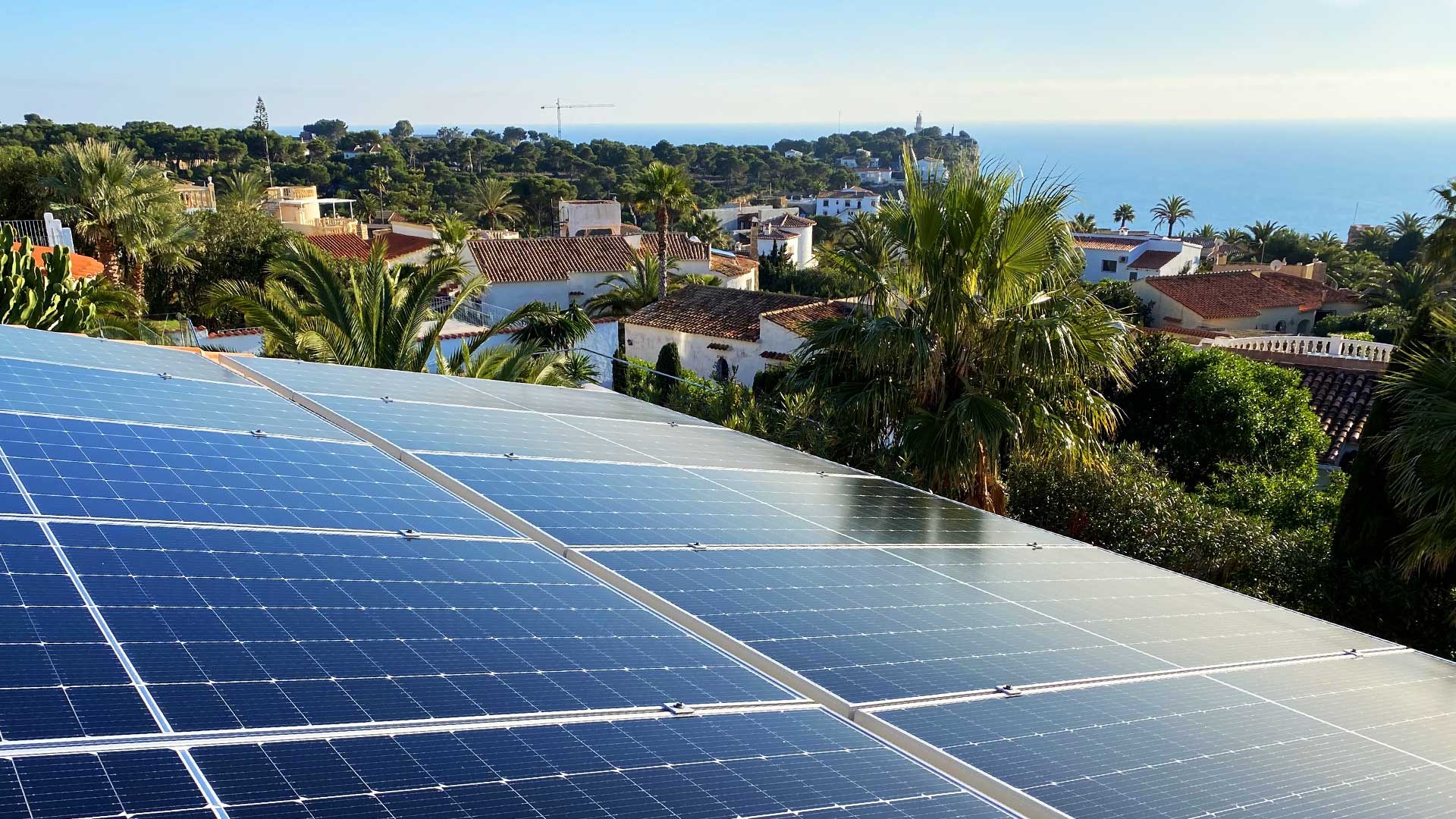
Why is a Virtual Battery Better than a Solar Battery?
You might be asking this.
Isn’t a solar battery better than a virtual battery?
There’s one key difference to note.
If you have a solar battery and don’t sell electricity to the grid… you still have standing charges to pay in your monthly bill.
So here’s the benefits of a virtual battery:
- A virtual battery lets you pay €0 per month in bills and even earn credit
- A virtual battery costs nothing (a good solar battery costs upwards of €4,000)
- A virtual battery requires no monitoring or maintenance (solar batteries can require constant monitoring or maintenance)
Solar batteries are only necessary for properties that are off-grid.
And if you’re considering installing solar and removing yourself from the grid, know that your installation costs will rise as you may need 2 or more solar batteries.
The virtual battery is currently the most-effective solution for going solar in 2023.
Why Isn’t Everyone in Spain on a Virtual Battery Deal?
At the beginning of 2023 about 200,000 homes had a solar panel installation in Spain.
But it’s estimated only 16,000 were signed up to a virtual battery.
Why so few?
Especially when the benefits seem so obvious?
It’s for two main reasons:
- The virtual battery was only legalized in late 2022 and many solar panel users don’t know of its existence
- The majority of virtual battery contracts are no better than a feed-in tariff
Spain’s consumer defence organisation (the OCU) published a report in 2023 comparing how much a normal villa would pay with 25 different energy companies.
The results are interesting.
A villa with solar panels would pay €0 for electricity per year with just 3 of 25 top companies.
The same villa would have paid up to €505 with some of the other 22 companies.
This is the SAME villa with the SAME solar panels and SAME consumption.
At MiSolar, we work exclusively with 1 of the only 3 companies that can get your electricity bills to €0 with a virtual battery in Spain.
instant calculation!
How Quickly Could You Break Even on a Solar Installation with €0 Electric Bills?
We’ve created an online calculator that generates an instant annual return and break even estimation with a €0 bill, fully optimised system and current package of solar incentives in Spain factored in.
Click below to get a result in the next 2-3 minutes.
Why Did Spain Take So Long to Introduce the Virtual Battery?
Spain has had a poor reputation for solar energy.
The reason is because of the ‘sun tax’ which Spain’s government introduced in 2015.
The law required producers of solar energy to pay a tax on self-consumption and it paralysed the solar industry.
But the market exploded after the tax was abolished on 5th October 2018.
Between 2018-2022, installed solar capacity increased 350%.
The final obstacle was removing the standing charge.
In April 2022 the author and renewable energy engineer Jorge Morales de Labra led a campaign in Spain to find a legal alternative to these charges.
That alternative was approved in autumn 2022 and dubbed the ‘virtual battery’.
In 2023, everything has changed.
Spain has suddenly shot past every other country to become the most solar-powered nation on earth.
There are now enough solar installations to produce 19.1% of the nation’s electricity.
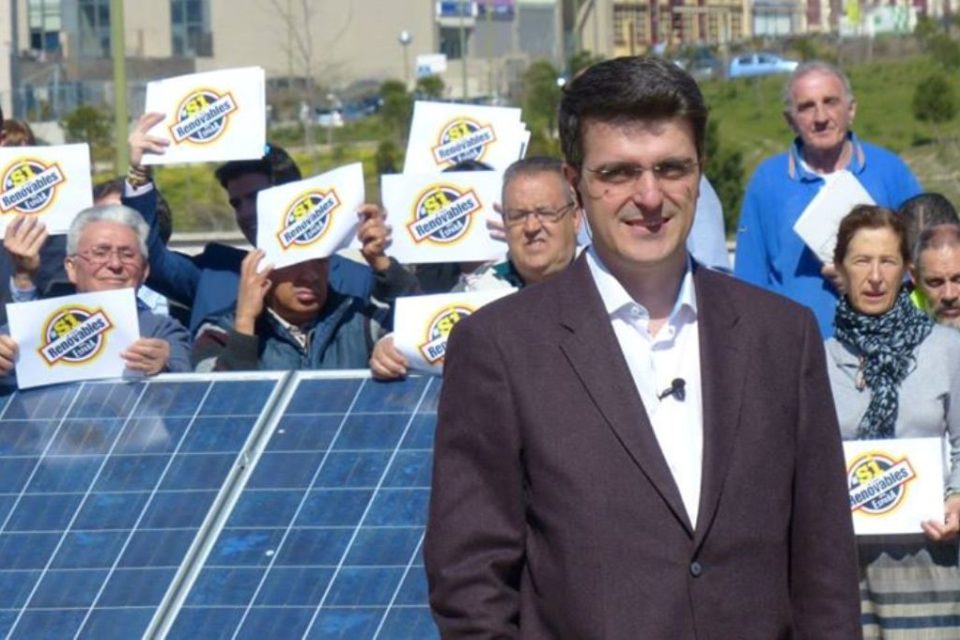
How Many Solar Panels Would I Need to Earn Credit With a Virtual Battery?
You may have noticed one thing about the virtual battery.
You’ll need to sell solar electricity to the grid in order to start earning credit…
…and this means installing a few more solar panels.
How many more?
To answer this question we’ve created a Solar Panel Calculator.
See the net section to find a link to it.
What if I Don’t Want to Install Solar Right Now?
Oh, one more thing.
Next Generation EU funds and government incentives will end on 31st December 2023.
Currently, here’s what you can get:
- €600 per kWp installed (roughly €1,800-€5,400 for most home installations).
- A 20-60% deduction of the total installation cost in your Spanish tax return (IRPF)
- An immediate reduction in your property tax (IBI)
- A 95% reduction in the licencia de obra (municipal tax) to install solar panels
There’s never been a better time to consider solar energy.
How much would your quality of life improve if you could bring this incredible comfort to your own home?
Even if it turns out you don’t have the space to install enough solar for it to make sense…
What do you lose in finding out?
Take your first step with the Solar Panel Calculator.
free download
Want to See a Comparison of Spain’s Top 25 Solar Feed-in Tariffs?
We’ve prepared a .pdf comparing the estimated electricity bill of a typical villa in Spain with solar panels on each of Spain’s top 25 feed-in tariffs and 8 virtual battery plans.
The data comes from Spain’s consumer defence organisation (OCU) and estimates the annual electricity bills for three different scenarios:
- Villa with solar panels and average consumption
- Villa with solar panels, average consumption & 3-4 extra panels to sell electricity to the grid
- Villa with solar panels and high consumption
The data is from 2023 when electricity bills were slightly higher than normal.
But as you can see…the same property with the same consumption could pay €0 annually with one provider and €550 with another – the only difference is the feed-in tariff!


Hello,
I am interested in your virtual storage and I have a few questions:
What is your current purchase price of electricity from my solar system?
Is there a maximum credit?
What is your sale price of electricity?
Can the credit be carried out from one month to the other?
Can the credit be carried out from one year to the other?
In short… If I use your virtual battery to store my energy, you would effectively buy my electricity in a form of credit and sell it back to me when I need it, and the credit DOES NOT HAVE AN EXPIRY DATE?
Hi Vincent. Please note the virtual storage is not ‘ours’. We work with one of the leading companies in Spain. There is no maximum credit. The sale price moves according to the market. The credit can be carried over from one month to another and between years. There is no time limit or expiry. This may be the case with other energy providers, but not with the one we use. Also the company we use has no fixed monthly subscription costs. In a report by Spain’s consumer defence organisation (la OCU) this company was rated as having the 1 of the 3 best virtual battery deals from 24 leading companies in Spain. You can call us for more information.